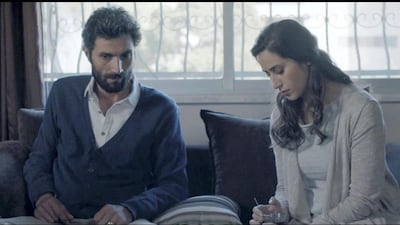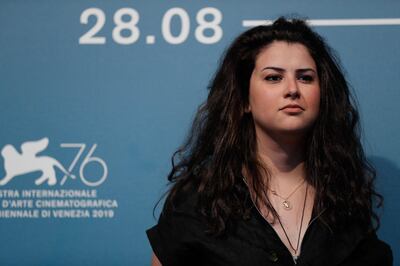Sitting in a cafe, in a maroon hoodie and matching cap, Zain Duraie, 30, is pondering a seminal moment in her life. After years working in the film industry, her second short as a writer-director, Give up the Ghost, was accepted into the prestigious Venice Film Festival last September. "Getting accepted into this festival has changed my life," she says, without a hint of exaggeration. "There were 500 people in the audience and they loved it. It was a really extraordinary experience."
For the Jordanian director, writer and actress, it's just the start of a run that's seen the film play at the El Gouna Film Festival in Egypt, where it won Best Arab Film, as well as dates in Tunisia and Morocco. Among the engagements to come: the Fribourg Film Festival in Switzerland, the Aflam film festival in Marseille and the Haifa Film Festival. Doubtless, this will be the first of many times her work travels across the festival circuit.
The 15-minute feature is a potent exploration of a couple facing the difficulties of infertility. Salam (Maria Zreik) discovers that she cannot have children with her husband, Ammar (Ziad Bakri), a fact that is anything but welcome news to his parents. As the story unfolds, economically told by Duraie and her editor Abdallah Sada, the focus steers towards Salam, and how she deals with an increasingly untenable situation.
The seed for Give up the Ghost came while Duraie was working on a different idea, for a feature-length film. Initially inspired by a couple she knew, who endured a similar problem in conceiving children, "I felt like I had an obligation to write about it," she recalls. "I spent a couple of months writing the first draft and that's when I proposed it to my producer and he got really interested in the idea. But it came from a root of anger basically." Thankfully, the couple's story wound up different from Salam's – they adopted a child.
Yet, Duraie wanted to explore Jordanian society and the external pressures women face to have a child at all costs. "I mean that's the norm. It is how the majority thinks. It's me trying to fight this mentality," she says. Undoubtedly, her opinions will be frowned upon in some of the more conservative quarters of her country. The film has yet to screen in Jordan, though she hopes it will show in April. "We're still not sure. We might screen it at a local festival here," she says. "It's super controversial."
Is there any sign that things are changing for the better? "No, it's not really changing," she sighs. "These things are hard to change in our part of the world, because a woman is born with the idea that this is her whole duty and obligation. She can work, she can be free in her life, but she has to do this obligation. It's hard sometimes to try and convince people: 'What if I don't want to have this kind of life? What if I want a different life?' This is the sub-context of the film."
When it came to casting, the writer-director took inspiration from those around her. She cast Palestinian actress Zreik, who recently featured in the Sacha Baron Cohen drama The Spy. Duraie had already encountered her in Wajib, a film by director Annemarie Jacir, a mentor to Duraie after they worked on Jacir's 2013 feature, When I Saw You. Likewise, Bakri was an actor Duraie knew from Mare Nostrum, a short she worked on as a production manager.
Aside from her artistic courage, what impresses about Duraie is how she's gone about her career. After graduating from Toronto Film School, she took numerous jobs as a production manager, including on 2016 feature Tiger Raid, to learn the nuts and bolts of moviemaking.
Encouraged by Jacir to make her first short, 2013's Horizon, she has continued to make the leap towards full-time directing. "I want to keep the momentum going. If I went back to production now, it would throw me off the track."
Now she is keen to get her first feature under way, a drama about a family that faces a crisis when their eldest son is diagnosed with a mental illness. “There is a huge question mark about what happens next and how they will face society and save their son,” she explains.
Is she drawn to the nuclear family as the ideal backdrop to explore the human condition? She nods. “I think the complexity of living inside a family household is very interesting. There are a lot of values, a lot of opinions, a lot of dysfunction.”
Given the sensitive subject of Give up the Ghost, I wonder if it's been easy for Duraie to pursue a filmmaking career rather than the more traditional paths expected of a woman in Jordan. "No, it hasn't been easy," she replies.
"You are always asked to be something that doesn't work for you. I see a lot of women who sacrifice their life at an early age, get married, have kids and now they're trapped. And it's hard for them to get out of it.
"These things motivate me to really say what I want to say as a filmmaker. I find my voice in these kinds of stories." She offers a wry smile. "Away from politics."
Give up the Ghost will screen at the Fribourg Film Festival in Switzerland next month


